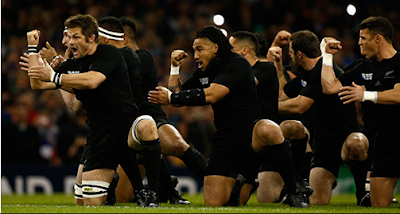Zinzan
Brooke: All Blacks will keep getting better
Even when Australia rallied to come back into the game at 21-17,
I was looking at their body language and they looked spent. There were
situations where they were committing six or seven players to a ruck to deal
with one All Black while the rest of New Zealand are spread out in a defensive
line.
Some of that is to do with the brutal path that Australia have
had to take to reach the final. To take on England, Wales, Scotland and
Argentina in consecutive weeks was a mighty tall order. They deserve all our respect
and admiration to fight the way they did.
You could see from the opening kick-off what New Zealand's
intention was when Kieran Read smashed Israel Folau. A couple of phases later
Conrad Smith did the same to Michael Hooper. It set the tone straight away.
This is the intensity we are going to deliver.
It is not just physical pressure that the All Blacks exert. They
do not give you any outs, any leeway. Every line-out, every kick-off, every
breakdown is contested. It is an enveloping, suffocating pressure. Some teams
can live with that for 50-60 minutes but rarely the full 80. That is why they
pull away in that last quarter. It also helps that you have the experience of
Dan Carter and Richie McCaw to call upon in those tight situations. When others
are slipping because of physical and mental exhaustion, they raise their game.
ALL BLACK GREATS
ALL BLACK GREATS
All those guys who are moving on like Dan, Conrad Smith, Ma'a
Nonu, Tony Woodcock, Keven Mealamu and in all probability Richie will go down
as All Black greats. I think in years to come, people will talk of the
privilege of watching them live. Certainly, I count myself blessed to have been
at Twickenham on Saturday to see their last games.
I feel uneasy with conversations about who is the greatest or
what an all-time All Black XV would look like. First of all, it is difficult to
compare different eras seeing as how much the game has evolved. More
importantly, it goes against the grain of being an All Black to put one guy
above another. The collective has always come first.
It is almost paradoxical but to become a great All Black you
have to forget about your individual needs and desires. That is why I think it
is unfair to compare Richie McCaw with say Josh Kronfeld. They are part of the
same club.
That is why I was so impressed by the way Richie has delayed his
decision about his retirement to stop making last week all about him. He has
taken control of the situation and will make his decision on his own terms.
NO ONE IRREPLACEABLE
NO ONE IRREPLACEABLE
It goes without saying that the All Blacks are going to miss
those guys. It is almost 700 caps worth of experience they will be losing,
however in New Zealand you learn that no one, including Dan or Richie, is
irreplaceable. The same conversations happened after Tana Umaga and Michael Jones
retired, but they were replaced. Someone always comes along.
That is because the conveyor belt is always creating new
superstars. I watched a lot of ITM Cup rugby and there were some ridiculous
talent waiting to come through. Akira Iaone, the Auckland No.8, will be pushing
Kieran Read for his shirt very soon. Ardie Savea, the brother of Julian, is
also an openside with a huge future.
Steve Hansen has also planned for this moment. Sam Cane, who
would be a starter for most other teams, has been groomed in Richie's shadow
for the past three years. He is a part of their leadership group and will be
ready to step up if he holds off the likes of Savea. Likewise, Beauden Barrett
and Malakai Fekitoa have learnt the ropes from Carter and Nonu.
That is why people expecting New Zealand to dip will be
disappointed. Just as the crossbar was raised after 2011 so Hansen and his
other coaches will raise it again in 2016. Crucially, they can still call upon
the power of the shirt.
All teams have pride in representing their country, but in New
Zealand it means something more to pull on an All Black jersey. The expectation
of wearing the black jersey places a significant value, meaning and
responsibility for you as a player and for us as nation. When the All Blacks
lose, it is not just the 23 players who hurt but the whole country.
For most New Zealanders it is not whether the All Blacks win or
lose but how much they beat the other team by. That expectation would crush
other teams but it lifts the All Blacks. So whoever eventually fills Richie's
and Dan's shoes will be expected to live up to their standards straight away.
The kings are dead, long live the kings.
- The Telegraph, London















